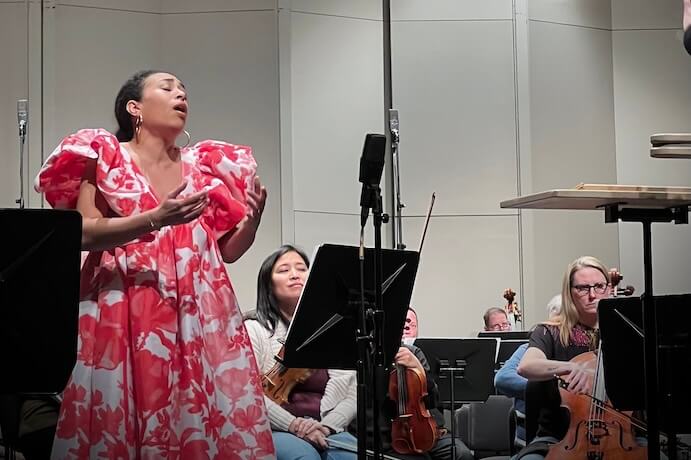Candice Hoyes is a multi-hyphenate artist who leans into the full range of her creativity. As a soprano, producer, songwriter, filmmaker, and archivist, Hoyes leads with her versatile and dynamic voice to not only tell the stories of her Jamaican heritage, but also those who inspire her. On Jan. 22, Hoyes makes her NYC recital debut with a multimedia performance dedicated to the legacy of Belle da Costa Greene, one of the most talented, dynamic, and important librarians in American history who served as the first director of the Morgan Library and Museum.
In addition to her widely regarded fervour for bidding on new pieces at auctions, Greene is vividly remembered for her elaborate headpieces and unwavering confidence and had a masterful eye for garnering the rare pieces that transformed the Morgan into the institution it is today. Before her death, Greene destroyed all of her personal diaries, despite her commitment to the preservation of the past, concealing how she managed to accumulate so much success in a time where women could not even vote – and how she did so as a Black woman passing as white.
Hoyes shares Greene’s passion for African American cultural history; her upcoming performance at the Morgan highlights the ways in which Greene interacted with classical music through her own lineage (Greene’s family included several composers and performers) and her frequent trips to the MET. The program includes works by Greene’s contemporaries, including Countee Cullen, Florence Price, and Langston Hughes, in addition to Hoyes’ own musical reflections on Greene’s personal letters. Excited to learn more, I spoke with Candice about her upcoming performance and her preparation and inspiration for curating this project.

Candice Hoyes and the Spingfield Symphony (OH) — Courtesy of artist
As a contemporary artist, what draws you to multimedia performances?
I have expanded my practice as a recitalist to include many facets of me. As I gained new experiences as a performer around the world, it started to hit home for me that in a certain sense I’m the only one who knows my journey, so why not include all my influences – musical, historical, familial, cultural- in the repertoire. In this particular recital “Belle Canto,” I celebrate musical performance of repertoire spanning baroque to contemporary. I bring in archival materials on curatorial innovation and lived experiences of Greene, I use selected poetry, discourse, research, original music specifically composed for my voice by me. And it will expand with each performance. That’s my personal style.
A lot of the mystery involving Greene’s legacy was contained in the diaries she destroyed before her death. What further insight can we expect to gain about her life, personality, and relationships from the correspondences included in your upcoming recital?
I contend, if this piece has one underlying thesis, it’s that that the legacy of Belle holds an opportunity to understand a uniquely powerful historical scholar from multiple vantages, in a world that too often only indicts a person for racially passing rather than the nation. You gain a sense of her artistic values, work ethic, the expanse of her daily life as well as the emerging champions of social justice and racial liberation among her generation, from Shirley Graham Du Bois to Countee Cullen. I spend time sharing about the correspondence between her and her lover and confidant, Bernard Berenson, but you also hear about her nephew, Bobbie.
Your recital program includes deep collaborations with pianist Kevin Miller and composer Marta Sanchez. Do you know if Greene was also collaborating with her contemporaries, particularly those spearheading the Harlem Renaissance steps away from her stomping grounds?
After the age of sixteen, Belle da Costa Greene severed her ties to the historically Black family both maternal and paternal, and this is signified in her changing her name. So she was not publicly collaborating with Black artists of the Harlem Renaissance. She remained close with her siblings, her mother and nephew, who all coordinated to hide their Black identity. Belle was extremely collaborative and socialized widely, and traveled and worked with composers, editors, visual artists, all of whom were intimately tied to her directorship at the Morgan.
There are many painful layers implied in her story regarding the way this secrecy impacts a person. In another regard, she created a life that allowed her to expand the notion of libraries as public resources for people of many walks, not just the elite. She mentored and advanced other women in her field, namely at the Morgan. She raised her nephew. There is so much to say about her, and many questions raised for reflection.
As a storyteller, in what ways do you resonate with Greene’s life and legacy?
I know as a researcher and archivist that Greene both lived her career as a white woman and lived her childhood as a Black child from a family steeped in scholarship, languages, faith, music, literature and the racial liberatory struggle for equality. Her father Richard Greener was a Black civil rights pioneer, who was the first Black dean of University of South Carolina Law School. I find inspiration in the aspect of Greene that strategized to defy racist and sexist structures that would have precluded her intellectual achievements. I also mourn that she and the adults in her life did not enjoy the fullness of who they were in the light of day. That pains me and I’m grateful to explore it as an artist.
You’ve explored other genres and scholarly pursuits outside of classical music. Can you speak to what has inspired this work and share any advice you have for classical musicians who are interested in other creative avenues, but are afraid to branch out?
My only advice is to remember that we only stand to gain by being ourselves, and no where is that as true as it is in an artistic practice. My creative practice has led me to wear many, many hats beyond genre- to be a producer, a mother, a writer, visual artist. So what is an “avenue” anyway if not a place to go?
I CARE IF YOU LISTEN is an editorially-independent program of the American Composers Forum, and is made possible thanks to generous donor and institutional support. Opinions expressed are solely those of the author and may not represent the views of ICIYL or ACF.
You can support the work of ICIYL with a tax-deductible gift to ACF. For more on ACF, visit composersforum.org.






